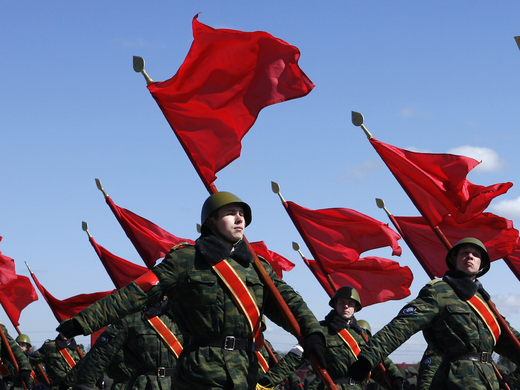CIGI Paper No. 40, “Crisis Management Mechanisms: Pathologies and Pitfalls,” argued that the Cuban missile crisis held valuable lessons for leaders who might be forced to confront a future crisis in the East China Sea. Here James G. Blight and janet M. Lang, CIGI Chair of Foreign Policy Development and Research Professor at the Balsillie School of International Affairs respectively, explore the lessons of Super Bowl XLIX for understanding the difficulty people have in appreciating and learning from nuclear risk during the Cuban missile crisis.
In reviewing all the Monday-morning quarterbacking on the web the day after the Super Bowl, we were struck by the analogy between the psychology of winning a game and the psychology of trying to get people to focus retrospectively on the nuclear danger in the Cuban missile crisis. Bear with us. This is not a joke. At least, we do not think of it as a joke, although we wish it were.
A typical celebration of quarterback Tom Brady and the victorious New England Patriots is Robert Mays’ “‘He Lives for That S--t’: How 37-Year-Old Tom Brady Dismantled One of the Greatest Defenses Ever.” It’s all about how Brady stuck it to the Seattle Seahawks in his final drive of the game. Which he did.
But what if the Seahawks had scored on their last drive, instead of flaming out via a New England interception? In that case, how would the Patriots, including Brady, be assessed by the “experts,” and by fans and journalists? They would be falling all over themselves in an endless recycling of what-ifs. What if this? What if that? What if the other thing? Even if they had lost, Brady would still, as Mays suggested, have “dismantled one of the greatest defenses ever” (on the Pats last drive of the game, during which he went 8 for 8 passing). The piece would have had a very different title if Seattle had won. The title and tenor of the piece and thousands of others like it would probably have been something along these lines: “At 37, is Tom Brady over the hill, after throwing two interceptions?” The implied answer: you bet! Or: “Is The Era of the Patriots’ Dynasty Over, After Heartbreaking Loss to Seahawks? Implied answer: uh huh!
But instead, due almost entirely to a single play at the end of 60 minutes of an exciting football game, it is the Seahawks partisans who are condemned to the virtual history of Super Bowl XLIX. What if they had given the ball to Marshawn Lynch and let him try to run the ball into the end zone? Ha! That’s easy: the Seahawks would have won! Or: what if Seahawks quarterback Russell Wilson had “done what he should have done” and thrown the pass out of bounds, stopping the clock, and then let Lynch run for pay dirt? A typical handwringing piece about the play called by Coach Pete Carroll that resulted in an interception by rookie Malcolm Butler of the Patriots is titled, “Pete Carroll botches the Super Bowl.” The title says it all. Another piece, by Boston journalist Jackie McMullen, actually predicts that Russell Wilson will spend the next several months haunted by “what-ifs” deriving entirely from one interception of one pass in one game.
The following principle seems to apply:
- Bad outcome = what-if what-if what-if what-if ...
- Good outcome = who cares about what might have been?
In this context, think again about the Cuban missile crisis. It seemed to many in October 1962 that Armageddon was at hand. U.S. President John F. Kennedy made the scariest speech in history on October 22, 1962, in which he seemed to say that a Soviet nuclear attack might be coming and, if it did, the Soviet Union would be utterly and completely destroyed. Then what happened? Nothing happened. Or very close to nothing. One American U-2 pilot died, a few Soviets died in an accident, and that was that. No air attacks on Cuban missile installations. No invasion of the island of Cuba. Back to the status quo ante.
In the wake of the Cuban missile crisis (if you can believe it) many of the what-ifs on the U.S. side were about opportunities that were missed to attack and invade Cuba and overthrow the government in Havana. The peaceful outcome seemed to many to mean that there was never much nuclear danger in the first place. That (supposedly) being the case, then it was definitely a mistake not to go for it. But on the whole, people all over the world breathed a sigh of relief that, against the background of expectations of Armageddon, nothing happened. Nada. There was an almost cosmic sense, at the end of the crisis, that everybody won! Everyone (almost everyone) survived, therefore we all won. This is what makes the Cuban missile crisis the most significant non-event in recorded history.
Alas, everything we have discovered about the crisis over the past quarter century suggests that the crisis was even more dangerous than was thought at the time. Scholars like us play out what seem to us all the most plausible and important virtual histories—all the what-might-have-beens. What if a second U-2 had been shot down? What if the Soviet crews at the missile sites had gotten the missiles operational and ready to launch before the Americans learned about them? What if the Cubans had been able to shoot down one or two low-flying U.S. reconnaissance planes? What if a Soviet submarine commander, believing the war had already commenced, decided to fire a nuclear-tipped missile at a U.S. battle group in the Caribbean? What if Richard Nixon had been president of the United States? Nixon criticized Kennedy bitterly for “backing down” by not invading Cuba. Far Fetched? Consider the results of the 1960 presidential election:
- Kennedy: 34, 220, 894 votes (49.7%)
- Nixon: 34, 108, 157 votes (49.6%)
Would Nixon have actually ordered an attack on Cuba? No one knows for sure. But if you ask us, the answer is “probably.”
What if an attack, ordered by Nixon or even by Kennedy in the event that the Soviets decided to attack first, had produced a “little” nuclear war, quote, unquote? Say 10 million people died, but civilization survived—the doomsday scenario from “The Road” didn’t happen. Would this have helped people like us, who had nothing to do with the crisis, experience some of its fear and loathing vicariously? Would this have led to some sort of extra momentum (to use another football term) toward ridding the world of nuclear weapons? As you know, the nuclear strategist Herman Kahn’s answer was: maybe, but only if you sign all your treaties before the dead are buried. If you wait too long, the recriminations will begin, and another war will result, probably worse than the initial war.
These considerations lead us to suggest the following footnote to Robert McNamara’s prediction as stated in “The Fog of War”: “The indefinite combination of nuclear weapons and human fallibility will result in the destruction of nations [perhaps even all nations].” If we can’t learn from a very close call to losing everything, are we doomed to destroy ourselves, in part because of our inability to take seriously the proposition that things could have turned out differently, and that in fact we came within an eyelash of Armageddon in October 1962? Are we doomed to an actual Armageddon because we lack the imagination to grapple with the virtual Armageddon of October 1962?
We close with Lenin’s question: What is to be done? Lenin argued that workers are unlikely to embrace Marxism over economics, wages and so on. Instead, what is needed is a vanguard of those in the know who can lead the masses forward. But how do you form a vanguard to eliminate a threat that most are unaware of, and whose principal proof of existence is a non-event more than a half century ago?
It is easy to enjoy the luxury of complacency after an international crisis is resolved. It is too late after it is not.


